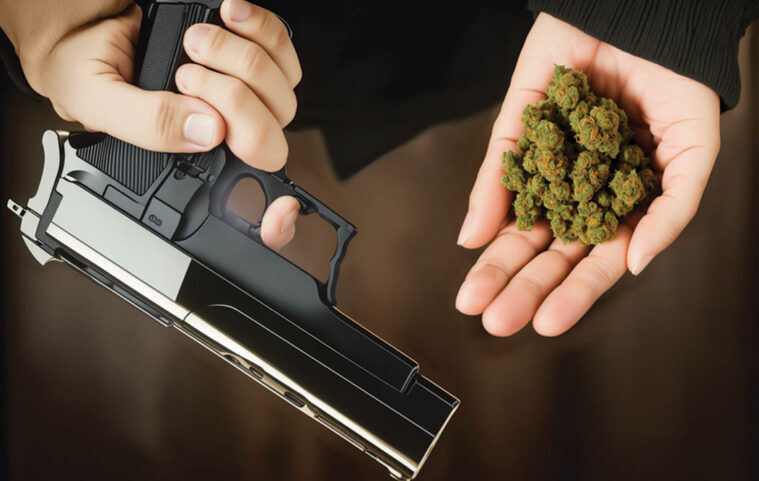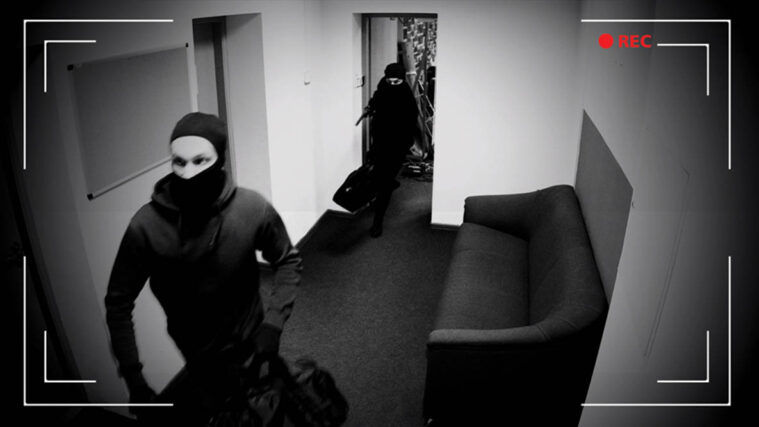Cannabis businesses along the West Coast are struggling to defend themselves against armed robberies and dangerous heists, putting the people who tend our plants at risk and driving up the cost and risk of weed for consumers.
The illegal drug business has always been dangerous; it’s the nature of criminality. Visions of narco-terrorists from the ’80s with MAC-11 automatic machine pistols fill the mind, or maybe it’s more Scarface, or gangster, but the streets bring heat when it comes to illegal narcotics. But how much of this is a function of illegality? This magazine has long asserted that if you made toilet paper or ketchup illegal, there would be a fast and vast black market that would get violent quickly when the shit hits the fan. We saw a glimpse of this during the early days of COVID-19, when price gouging and supermarket fights over supplies hit the nation.
What’s the point of this allegory? When Cannabis was illegal, it was considered the softest of the drugs and the least likely to get a person shot or killed over. Robberies and scams happened, but the farmers and people who sold and smoked weed were rarely violent. As the underground Cannabis scene merged into medical Cannabis in the early 2000s, the violence largely melted away, as permits for grows and small-time dispensaries popped up. There would be the occasional robbery of either, but it was less frequent when the drug was illegal.
Even the early years of Cannabis legalization enjoyed a relatively peaceful scene. The players made a lot of money. The states went apeshit with regulations and enforcement. And the criminals waited for the hullabaloo to die down until weed shops were as common as boba and pho in Seattle, before the crime spree targeting Cannabis retailers and production facilities really began.
The weed game gets dangerous, but not for cops or robbers

When weed was illegal, calling the cops on a robbery meant going to jail, so the reports were almost never filed unless the police ended up at a scene by coincidence or in response to a violent crime.
While the same situation for petty crime might cause a shopkeeper to not report every missing Snickers bar, the expectation after legalization was that cops would help protect their businesses when targeted by criminals.
“We called the Seattle Police Department after our burglary alarm went off for the third time in a matter of weeks. Thieves were cutting through a wall in an adjacent unit they’d broken into and cut into our facility, where they were able to steal Cannabis waiting to be sold,” one Seattle grower told the Leaf, choosing to remain anonymous. “The police didn’t respond for over 55 minutes — long enough that the burglary was over well before help arrived.”
The issue doesn’t just affect grows. A trend started by a gang known as the Kia Boyz began smashing stolen cars through Cannabis retailers several years ago. One retailer in the Seattle area shared a story that after having their storefront smashed in by a car, they hired a contractor to rebuild the front of the store at great cost, only to have another Kia blow through the work in progress a few days later in a second smash-and-grab. In these cases, a robbery happens so quickly that there is no danger of the police and criminals interacting.
While many Cannabis companies and owners are reluctant to go public about being robbed, Uncle Ike’s in Seattle has tracked the robberies informally, sharing the data publicly. Their data shows a disturbing trend: 40 robberies in 2021, 60 in 2022 and more than 100 in 2023. What’s most unsettling is that this data represents only reported incidents and likely does not reflect the full extent of the damage. According to Uncle Ike’s database, there are 339 confirmed robberies, with the most recent two occurring in 2025: on April 11, 2025, an armed robbery at Ruckus in Seattle, and on March 10 at West Seattle Marijuana, where an attempted armed robbery included shots fired.
For California, the smash-and-grab is old news and an ongoing problem. In Washington, Cannabis retailers now have reinforced concrete poles or planters, like those outside federal buildings, designed to deter and prevent vehicle attacks. But a lack of awareness and reporting left a huge target in between the two beleaguered states. Oregon’s Cannabis industry, a long-established medicinal market, was not ready for a brash wave of robberies in 2024, even after the failed experiment to decriminalize drugs led to unprecedented street and crime issues.
The Leaf has encountered stories of growers sleeping at their facilities to prevent robberies, putting lives on the line while local police and the Oregon Liquor Control Commission (OLCC) sit idly on the sidelines. There’s currently a movement to withhold state taxes on pot until the robbery issue is addressed by the OLCC and local law enforcement. For those living in West Coast cities or other American urban areas, the rise in crime and its spiraling effects on communities are undeniable. Nobody knows this better than the people growing and selling weed.
The War on Drugs hits legal pot below the belt
Our Founding Fathers railed against taxation without representation, which is a perfect description of the Cannabis industry today, with an additional caveat being a lack of protection, which is the icing on a gassy wedding cake.
Under federal law, Cannabis users are denied gun rights, a fundamental protection that is enshrined in the Second Amendment. The phrase “shall not be infringed” does not apply to legal Cannabis users. This effectively places Cannabis business owners in a more vulnerable class. When criminals know that an individual or community doesn’t have protection, they are more likely to rob, burglarize or otherwise prey upon that community. Cannabis businesses have the option to hire armed security, but that creates a third-party liability risk for both companies. Nobody wants to be robbed, but very few companies want to authorize lethal force in a retail robbery, regardless of how much cash is (or in today’s world, isn’t) in a safe onsite.
Police often don’t respond quickly or enthusiastically to reports of armed robbers either. In many West Coast urban centers, they simply won’t respond to most non-life-threatening emergencies. In Portland, Oregon, it’s common to be put on hold when calling 911.
The experiment to legalize Cannabis was supposed to begin dismantling the War on Drugs, which has ruined lives through nearly a century of bad policy and discriminatory laws. Today’s Cannabis operators pay excessive state and federal taxes, can’t write off expenses because of tax code 280E, can’t legally purchase firearms or protect their businesses, and risk becoming victims of crime and law enforcement if they respond to a robbery themselves.
This is the definition of a lose-lose scenario

Law and justice are evolving practices that shift with political power and public will. Certainly there’s no public support to restart the War on Drugs or lock up nonviolent offenders of any kind. But policy change is needed to protect our industry and the people risking their safety to provide for others.
For Cannabis to truly be legal, our state and federal governments must ensure gun rights and the ability to protect personal liberty and property for all Cannabis users. Cannabis businesses need to feel safe and be able to count on police to treat them not as criminals, but as business owners who deserve protection and service. Most importantly, tax code 280E, which forces cash on site and prevents write-offs and banking access, must end.
Forcing a cash-only industry puts the entire system at risk
Today, state governments play the role of the cartel, keeping their growers and sellers under the oppressive thumb of taxation and regulation, with the threat of force as a deterrent. This limits freedom for members while telling them to count on the government for protection. In Washington, where pot is taxed at 47% at the register, plus an additional 20% to 30% federal tax liability, the state takes all the cream and leaves a pittance for the industry to survive on.
More than anything, perhaps this explains why so many players are leaving the industry to return to the black market, where there are no taxes, no regulation and the understanding that people are truly responsible for their own protection. Compared to taxation without representation and hour-long waits for police responses, it’s almost as if the industry was designed to fail the people risking it all to provide the plant.
The future of the plant and the industry lies in legal pathways, but until the government can secure pathways to provide security and prosperity for those involved, the issues of criminality will always cut the industry on both sides.









